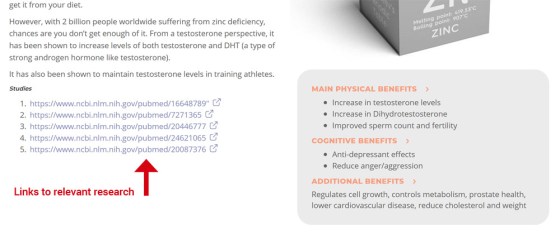Never the Twain Shall Meet
The supplements industry can elicit strong feelings. Testosterone boosters, in particular, have always been polarizing products and subject of fierce and passionate debate.
You don’t have to look far on bodybuilding forums to find sneering cynics laughing at anybody stupid enough to purchase them. And yet they do … in their millions in fact, and come back for more. It is a huge and growing industry.
The men (and women) who buy these products are not stupid, their testimony is not fake. For them, these products work, and they may consider the positive effects to be life changing.
So who is right?
What does the science say?
The difficulty in establishing an overall scientific consensus on the topic is that the meta-studies (studies of other studies) either tend to be highly biased or deeply flawed.
The latest study to come out at the time of writing is this one from June 2019 published in The World Journal of Men’s Health.
Conducted by a joint team from the University of Southern California’s Keck School of Medicine and Institute of Urology, it has been critical of the efficacy of testosterone boosters and widely used as a basis to claim they are all marketing and no science.
However, as with a lot of these reports, you don’t have to dig very deep to start raising serious questions.
And this is because the academics decided that they would choose the products they evaluated based on how well they ranked on Google when they search for the phrase ‘Testosterone Booster‘.
In a scathing summary of the work by Testosterone Resource one of the most telling quotes in an article full of telling quotes is;
Ranking top in Google does not mean the product is good. It means the website promoting the product is good.
The whole study is based on the shakiest of foundations. After a sequence of disastrous algorithm updates to Google’s RankBrain Artificial Intelligence, the products you find when you Google that term are now some of the worst in the whole industry.
And a terrible basis for a fair study on the effectiveness of these products.
What is the truth?
The truth is that everybody is right and everybody is wrong.
And the reason for this is that the question is a bad question. The real answer to the question “Do testosterone boosters work?” is “It depends.”
There is a huge body of properly conducted scientific research on testosterone, and the effects on testosterone of minerals, amino acids, herbs, vitamins, synthetic substances, and traditional Ayurvedic and Unani medicines.
It’s all there in PubMed, the online repository for biomedical literature. If it’s a clinical or academic study worth the name, it will be in that database.
And what you’ll find if you start reading into that work is that there are many well conducted, unbiased studies which have demonstrated improvements in testosterone levels for many of the ingredients you’ll find in testosterone boosters.
However! What you will also find is that the subjects of those studies were generally not young, ripped guys with massive biceps who go the gym 5 times a week and eat mostly turkey and pasta.
They were older men with some other medical symptom or men with clinically low testosterone and fertility levels.
The reason the subjects often have another medical ailment is that it’s expensive to run a study. The testosterone study often gets ‘tacked on’ to another study.
For example, let’s say there are 150 men who are outpatients at a hospital taking part in a study about low iron levels. They are having their blood drawn anyway, so the researchers measure their testosterone levels at the same time and run a separate side study.
So whilst there is a lot of evidence that certain ingredients boost testosterone, the evidence that they can boost testosterone only stacks up if the person taking them has lower than average testosterone levels.
Bottom Line: If you have high testosterone levels already, testosterone boosters will not make those levels go even higher.
Where is the evidence?
A large part of the criticism in the University of Southern California’s study is that testosterone booster websites don’t back up their claims with valid academic research.
Again, this just boils down to the fact that the websites they looked at were bad websites, with webmasters who know how to ‘game the system’ and appear at the top of Google search.
Reputable manufacturers will list the relevant scientific research that underpins their product.
Let’s take the example of one of the most highly regarded testosterone boosters on the market, Centrapeak. Now we know this product was not on the list used in the University of Southern California’s study because one of the ingredients isn’t on their total list of ingredients.
Look at the image below from their ingredients page. For every ingredient there is;
- The dosage and form of the ingredient.
- An explanation of each ingredient, and why it’s been included.
- A list of the types of benefits this ingredient has been shown to offer.
- A list of relevant links to pubmed studies which confirm the stated benefits.
Bottom Line: Look beyond the first page of Google to find the quality.
Conclusion
If you have low testosterone levels there’s a good chance a testosterone booster might work.
As a bonus, the ingredients they contain will often have many other health benefits over and above testosterone enhancement. The prices are a fraction of the cost of testosterone therapy and are a good way to start seeing if your dietary regime can be altered to improve your testosterone levels naturally.
Don’t let a few bad apples spoil the barrel. Anybody that expects to find the best products using a quick Google search is likely to end up disappointed. So do a bit of research and educate yourself.
Bottom Line: Take product recommendations from good quality websites, and buy products directly from established firms with solid reputations.
Add The Sports Daily to your Google News Feed!










